The Scale of a Story and the Scale of Mechanics
Dragon Age: Inquisition wants to be grand in scale but can its mechanics which focus on a small group support that vision?

I want to talk about a problem I have with the story in Dragon Age Inquisition, and it isn't a problem like "This character isn't believable", it doesn't have anything to do with the quality of the story or anything like that. My problems is with the inherent conflict between the scale of the game's story and the scale of the game's mechanics (which means there won't be spoilers, or at least no spoilers that aren't also in the game's marketing materials). Because the story is huge, it spans a continent and several countries, you become the leader of an army and a movement. And while I love that and think it is great my problem is that the game's mechanics are built around controlling and managing a small group of characters.
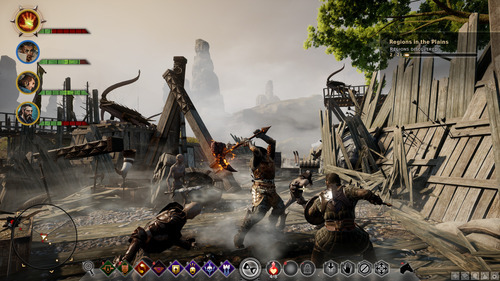
I don't mean to imply that this is the only game with such a problem, it is a very common one. DA:I simply is the most recent game I've played with this problem.
In DA:I you only ever control a small group of characters even though throughout the game your character gains control of armies. And in spite of the fact that you are the ONLY person who can close rifts, which are basically holes in reality, everyone else is totally fine with you and 3 other friends going off to kill dragons and other incredibly dangerous monsters. My problem is that the game's story wants to be about countries and movements and social change and yet the mechanics of the game necessitates a focus on a very few people. It isn't that either alone is bad, it is just that they don't necessarily go together well.
The hallmark of the Suikoden series is the 108 stars of destiny which mechanically means that the game has 108 characters for you get on your side (many join automatically but a very large percentage must be recruited by completing quests or other such challenges). Not all can be in your party but they all do things for the castle/town you help build up in every game. One might be a chef, another a blacksmith, or an armorer and so on. Now since the game wants to be about so many people when the normal battle system only allows you to have 6 people with you (1 always being the protagonist so really you only pick 5 to come along with you) that means that normally the game would leave most of these characters in the lurch with no play time allocated to them at all. But Suikoden is very clever and so they decided to have 3 different kinds of battle systems: duels (one on one fights), the normal-ish RPG battle system with 6 people, and grand army battles involving everyone.
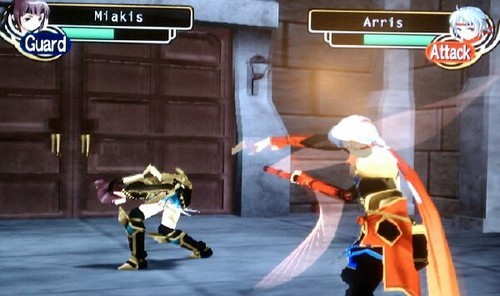
The duels were basically games of "Rock Paper Scissors" where the enemy told you what they were going to throw. They aren't terribly interesting.
These various battle systems gives them a chance to use all 108 of those people you get on your side, and you can even fill out those ranks with faceless people from the army you have been cultivating (to re-enforce that you do have an army). These larger battles give the game a larger scale for the player to appreciate the breadth of what they have been trying to do in the story. This allows the player to feel like they are the general of an army or leader of a movement WHICH THEY ARE!
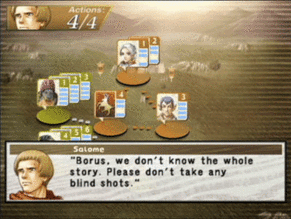
The Suikoden army battle system did have it's problems though, mostly stemming from how infrequently with which it was employed. Often the battles and moments that should feel the most grand and epic feel like you are playing a strange mini-game because the way in which you fight in this battle system is so foreign to how you typically fight in the game. This foreignness means that it can't challenge you because these kinds of battles are so few and far between that you never get a good feel for them. This is very similar to the problems that Brutal Legend and it's RTS combat suffered from.
This larger scale is what Dragon Age Inquisition is missing, because in spite of all the game tells you about what your character is to the story, mechanically they are just a very strong character that goes on special missions for the Inquisition. In this way the set up of the protagonist in Dragon Age 2 made the most sense out of all the protagonists for the DA series because Hawke wasn't a leader, she were just a really strong local hero who had made a name for herself. Hawke didn't lead an army, Hawke just traveled around with her friends and took care of local issues while a larger plot she couldn't contain or stop developed. It's focus on a small number of people makes sense because those were the people who mattered to her story and made mechanical sense because mechanically the game only ever cared about Hawke and her friends.
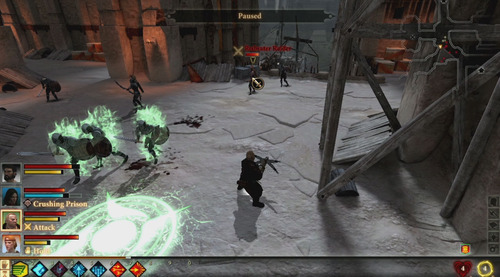
That isn't to say Dragon Age 2 wasn't without problems of it's own, just not this one. Bioware seems to come with completely new problems for every iteration of their games, often problems they had already solved.
Suikoden finds a way to include everybody, to have a larger scale, but it struggles with it because it needed to invent entirely different mechanics to have this larger scale. A game series that has found a great way to have both the small scale and large scale combined into a single mechanical vocabulary is the Warcraft series. The game's heroes give it strong characters to focus on and control in the small scale and yet the RTS base of the game means you can zoom out to see and control the battle around them. Not just the battle, but also the economy of the people in your care which makes you feel like not just a strong person in the middle of a fight or like a general on the front lines of a war, but like a true leader in control of every part of the war effort on every level of the war. All this done is with a single mechanical vocabulary too, you don't have to relearn how to play the game based on how many characters this chapter of the game wants to focus on.
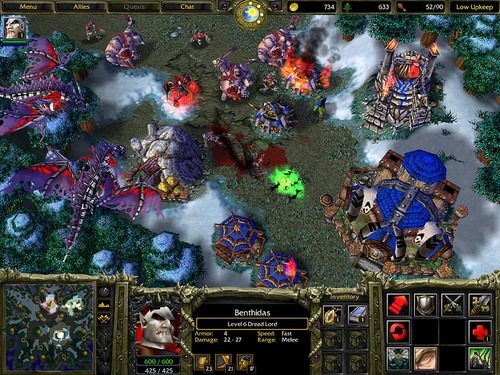
That isn't to say the game succeeds at both large and small scales equally well, it is much stronger as a zoomed out RTS game than as a game where you control a single hero. That said a few simple modifications to how it does control on the small scale ended up with MOBA games which are immensely popular games where everyone is in control of a single character (usually).
The Civilization series has a great system for talking about the rise and fall of nations but is also happens to be a terrible one for talking about individual people in the way that Dragons Age's system can effortlessly do so. That isn't saying that either system is better or worse than the other, rather I'm saying that each has their own strengths and weaknesses when it comes to story telling. Those weakness can be overcome with effort, but if they aren't then it can leave the game feeling strange and disjointed. It can make the story feel off even when it hits all the right beats because the mechanics are telling a different story. While the story of DA:I tells of someone immensely important the mechanics tell a story of someone who is very strong, trusted and yet based on the tremendous level of danger on the missions they are so blithly sent on that they are also someone who is ultimately disposable. In Dragon Age 1&2 the protagonist being semi disposable made some sense, it doesn't though in DA:I and so the mechanics and story don't mesh as well as they really should.
Does that make sense?
Read more about:
BlogsAbout the Author(s)
You May Also Like













